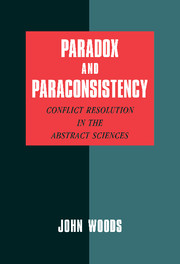3 - Managing Inconsistency
Published online by Cambridge University Press: 05 June 2012
Summary
[T]he task is to find a system … which: 1) when applied to the contradictory systems would not always entail their overcompleteness, 2) would be rich enough for practical inference, 3) would have an intuitive justification …, the satisfactory condition (3) being rather difficult to appraise objectively.
S. Jáskowski, “Un Calcul des Propositions Pour Les Systèmes Déductifs Contradictoires,” 1948RECONCILIATION
Let us begin with a frank question: How is conflict resolution possible in the abstract sciences? So far I have been emphasizing the cost-benefit factors that attach to ad hominem maneuvers. Actual argumentative practice suggest five prominent forms of the ad hominem.
arguments per impossibile
reductio ad absurdum arguments
reductio ad falsum arguments
refutations of the Aristotelian sort
other arguments from cost.
Since each of these is a strategy for winning an opponent to the antagonist's view of things, or to get the opponent to abandon the defense and advocacy of his own version of those matters, it is appropriate that we give these five dialectical techniques the general name of procedures for surrender.
We have seen that reductio arguments, as they are standardly described by logicians, are caught in the maw of Philosophy's Most Difficult Problem (one disputant's reductio is another disputant's proof of a surprising truth). We shall have later occasion to see that not even the argument per impossibile escapes this snare.
Of the five, the last two – refutations and arguments from cost – stand out for the resistance they make possible to the Problems' indeterminacy.
- Type
- Chapter
- Information
- Paradox and ParaconsistencyConflict Resolution in the Abstract Sciences, pp. 80 - 119Publisher: Cambridge University PressPrint publication year: 2002



